Investigating Strategies for Managing Cultural Diversity at Hotel Ibis
VerifiedAdded on 2023/01/11
|15
|3032
|79
Report
AI Summary
This research proposal investigates the strategies employed by Hotel Ibis to manage cultural diversity in the workplace. The study aims to identify these strategies, understand the challenges faced, and provide recommendations for improving employee retention and fostering a diverse and inclusive environment. The proposal outlines the research objectives, which include defining cultural diversity, examining organizational challenges, and determining effective management strategies. The methodology involves qualitative and quantitative methods, including questionnaires and literature review, with a focus on inductive research and interpretivism. The proposal also details the research approach, data collection methods, sampling techniques, data analysis procedures, ethical considerations, and the timeline for the research project. The study will use both primary and secondary data collection methods and random sampling to gather information from hotel managers. The research will analyze the data using a thematic approach. The proposal includes a detailed Gantt chart outlining the activities and timescales for the project, along with references to relevant literature and an ethical approval form.
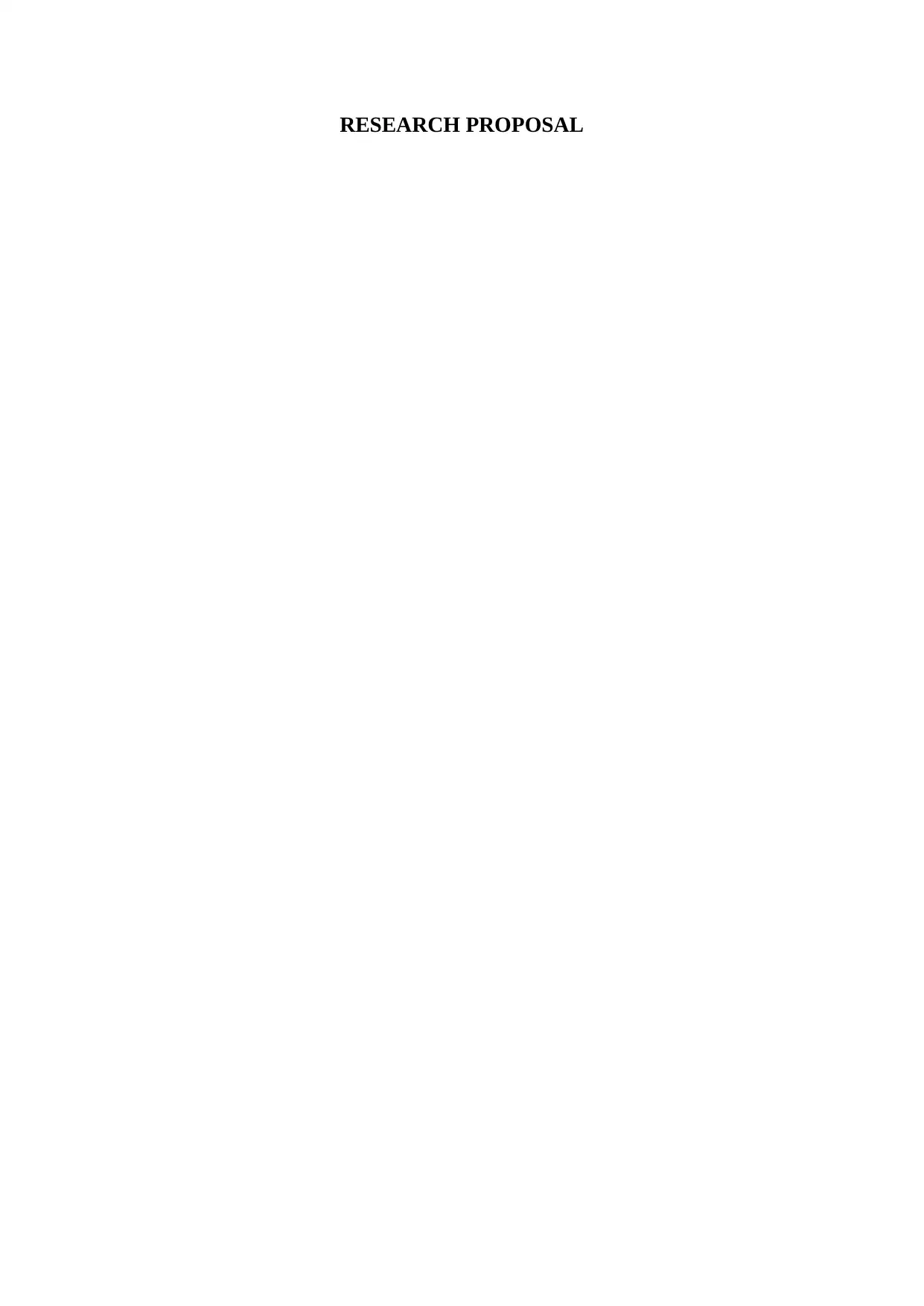
RESEARCH PROPOSAL
Paraphrase This Document
Need a fresh take? Get an instant paraphrase of this document with our AI Paraphraser
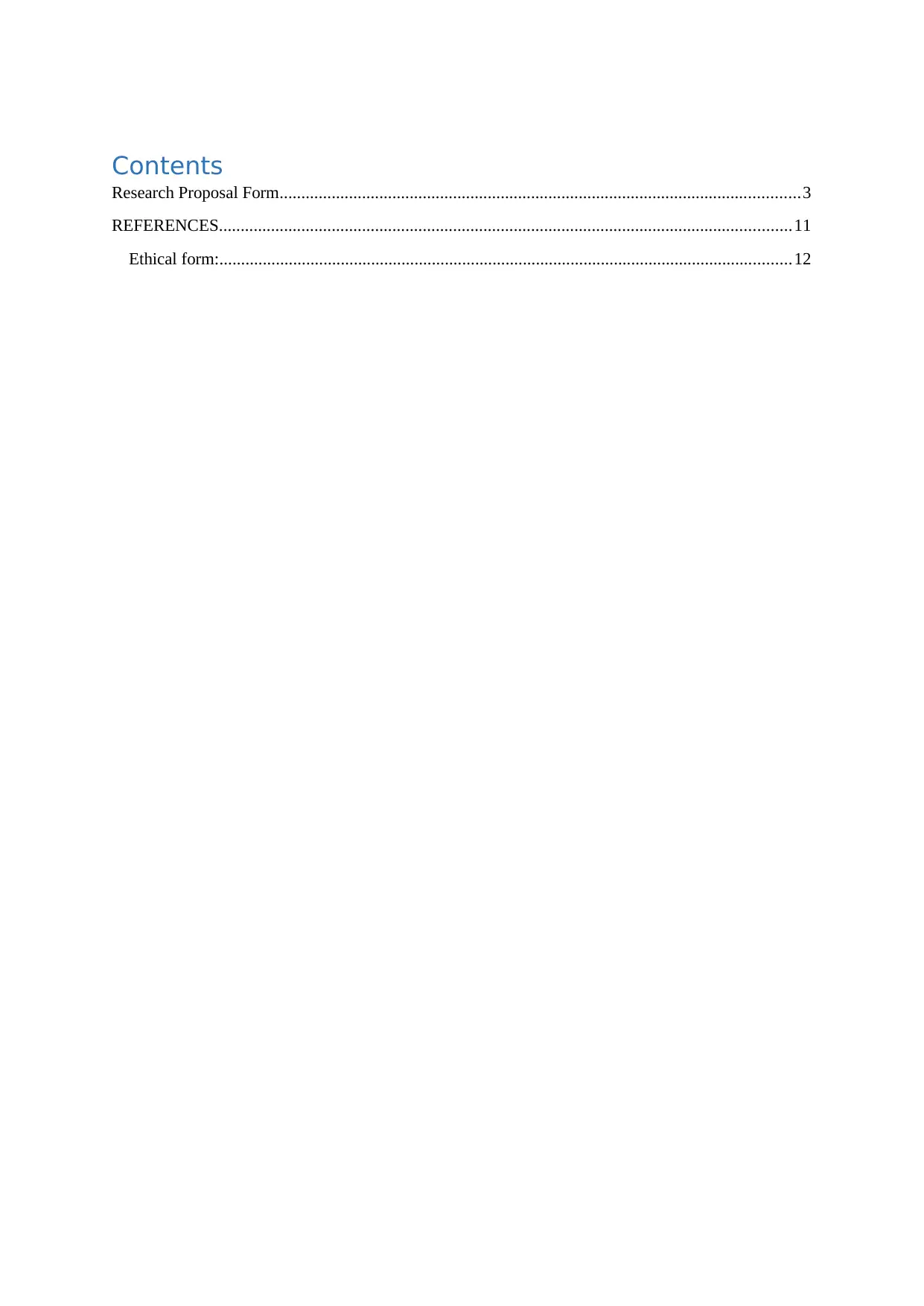
Contents
Research Proposal Form........................................................................................................................3
REFERENCES....................................................................................................................................11
Ethical form:....................................................................................................................................12
Research Proposal Form........................................................................................................................3
REFERENCES....................................................................................................................................11
Ethical form:....................................................................................................................................12
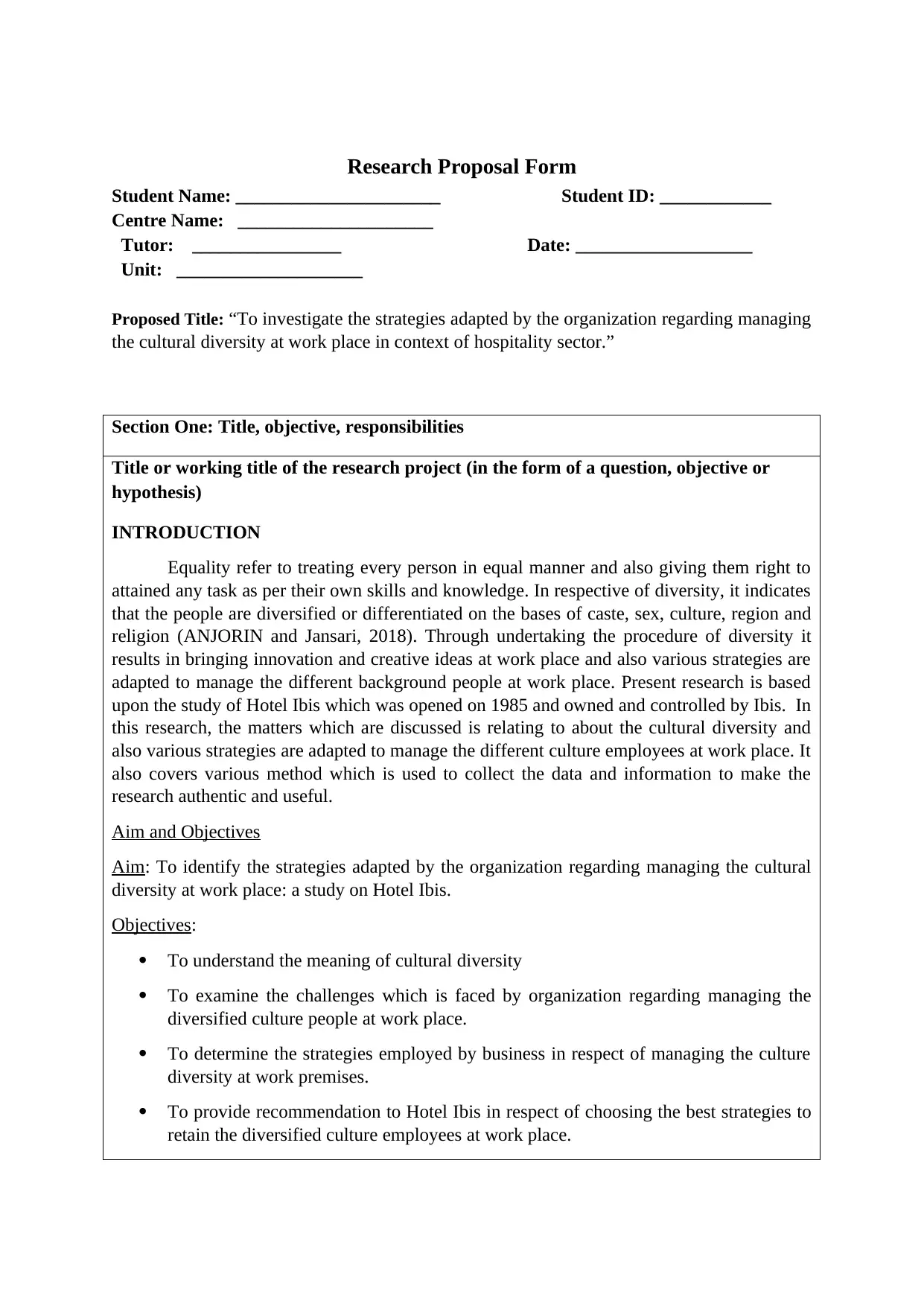
Research Proposal Form
Student Name: ______________________ Student ID: ____________
Centre Name: _____________________
Tutor: ________________ Date: ___________________
Unit: ____________________
Proposed Title: “To investigate the strategies adapted by the organization regarding managing
the cultural diversity at work place in context of hospitality sector.”
Section One: Title, objective, responsibilities
Title or working title of the research project (in the form of a question, objective or
hypothesis)
INTRODUCTION
Equality refer to treating every person in equal manner and also giving them right to
attained any task as per their own skills and knowledge. In respective of diversity, it indicates
that the people are diversified or differentiated on the bases of caste, sex, culture, region and
religion (ANJORIN and Jansari, 2018). Through undertaking the procedure of diversity it
results in bringing innovation and creative ideas at work place and also various strategies are
adapted to manage the different background people at work place. Present research is based
upon the study of Hotel Ibis which was opened on 1985 and owned and controlled by Ibis. In
this research, the matters which are discussed is relating to about the cultural diversity and
also various strategies are adapted to manage the different culture employees at work place. It
also covers various method which is used to collect the data and information to make the
research authentic and useful.
Aim and Objectives
Aim: To identify the strategies adapted by the organization regarding managing the cultural
diversity at work place: a study on Hotel Ibis.
Objectives:
To understand the meaning of cultural diversity
To examine the challenges which is faced by organization regarding managing the
diversified culture people at work place.
To determine the strategies employed by business in respect of managing the culture
diversity at work premises.
To provide recommendation to Hotel Ibis in respect of choosing the best strategies to
retain the diversified culture employees at work place.
Student Name: ______________________ Student ID: ____________
Centre Name: _____________________
Tutor: ________________ Date: ___________________
Unit: ____________________
Proposed Title: “To investigate the strategies adapted by the organization regarding managing
the cultural diversity at work place in context of hospitality sector.”
Section One: Title, objective, responsibilities
Title or working title of the research project (in the form of a question, objective or
hypothesis)
INTRODUCTION
Equality refer to treating every person in equal manner and also giving them right to
attained any task as per their own skills and knowledge. In respective of diversity, it indicates
that the people are diversified or differentiated on the bases of caste, sex, culture, region and
religion (ANJORIN and Jansari, 2018). Through undertaking the procedure of diversity it
results in bringing innovation and creative ideas at work place and also various strategies are
adapted to manage the different background people at work place. Present research is based
upon the study of Hotel Ibis which was opened on 1985 and owned and controlled by Ibis. In
this research, the matters which are discussed is relating to about the cultural diversity and
also various strategies are adapted to manage the different culture employees at work place. It
also covers various method which is used to collect the data and information to make the
research authentic and useful.
Aim and Objectives
Aim: To identify the strategies adapted by the organization regarding managing the cultural
diversity at work place: a study on Hotel Ibis.
Objectives:
To understand the meaning of cultural diversity
To examine the challenges which is faced by organization regarding managing the
diversified culture people at work place.
To determine the strategies employed by business in respect of managing the culture
diversity at work premises.
To provide recommendation to Hotel Ibis in respect of choosing the best strategies to
retain the diversified culture employees at work place.
⊘ This is a preview!⊘
Do you want full access?
Subscribe today to unlock all pages.

Trusted by 1+ million students worldwide
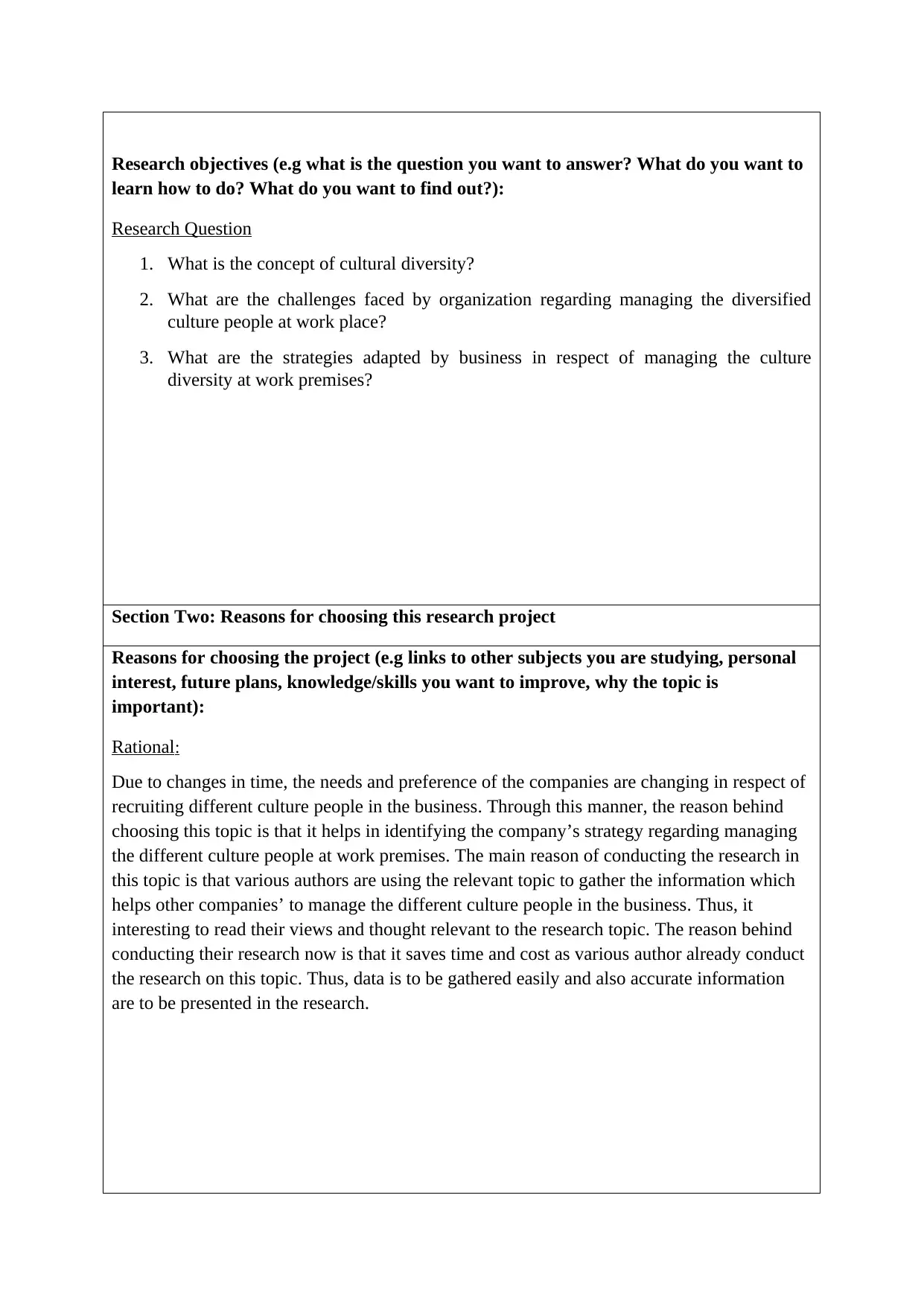
Research objectives (e.g what is the question you want to answer? What do you want to
learn how to do? What do you want to find out?):
Research Question
1. What is the concept of cultural diversity?
2. What are the challenges faced by organization regarding managing the diversified
culture people at work place?
3. What are the strategies adapted by business in respect of managing the culture
diversity at work premises?
Section Two: Reasons for choosing this research project
Reasons for choosing the project (e.g links to other subjects you are studying, personal
interest, future plans, knowledge/skills you want to improve, why the topic is
important):
Rational:
Due to changes in time, the needs and preference of the companies are changing in respect of
recruiting different culture people in the business. Through this manner, the reason behind
choosing this topic is that it helps in identifying the company’s strategy regarding managing
the different culture people at work premises. The main reason of conducting the research in
this topic is that various authors are using the relevant topic to gather the information which
helps other companies’ to manage the different culture people in the business. Thus, it
interesting to read their views and thought relevant to the research topic. The reason behind
conducting their research now is that it saves time and cost as various author already conduct
the research on this topic. Thus, data is to be gathered easily and also accurate information
are to be presented in the research.
learn how to do? What do you want to find out?):
Research Question
1. What is the concept of cultural diversity?
2. What are the challenges faced by organization regarding managing the diversified
culture people at work place?
3. What are the strategies adapted by business in respect of managing the culture
diversity at work premises?
Section Two: Reasons for choosing this research project
Reasons for choosing the project (e.g links to other subjects you are studying, personal
interest, future plans, knowledge/skills you want to improve, why the topic is
important):
Rational:
Due to changes in time, the needs and preference of the companies are changing in respect of
recruiting different culture people in the business. Through this manner, the reason behind
choosing this topic is that it helps in identifying the company’s strategy regarding managing
the different culture people at work premises. The main reason of conducting the research in
this topic is that various authors are using the relevant topic to gather the information which
helps other companies’ to manage the different culture people in the business. Thus, it
interesting to read their views and thought relevant to the research topic. The reason behind
conducting their research now is that it saves time and cost as various author already conduct
the research on this topic. Thus, data is to be gathered easily and also accurate information
are to be presented in the research.
Paraphrase This Document
Need a fresh take? Get an instant paraphrase of this document with our AI Paraphraser
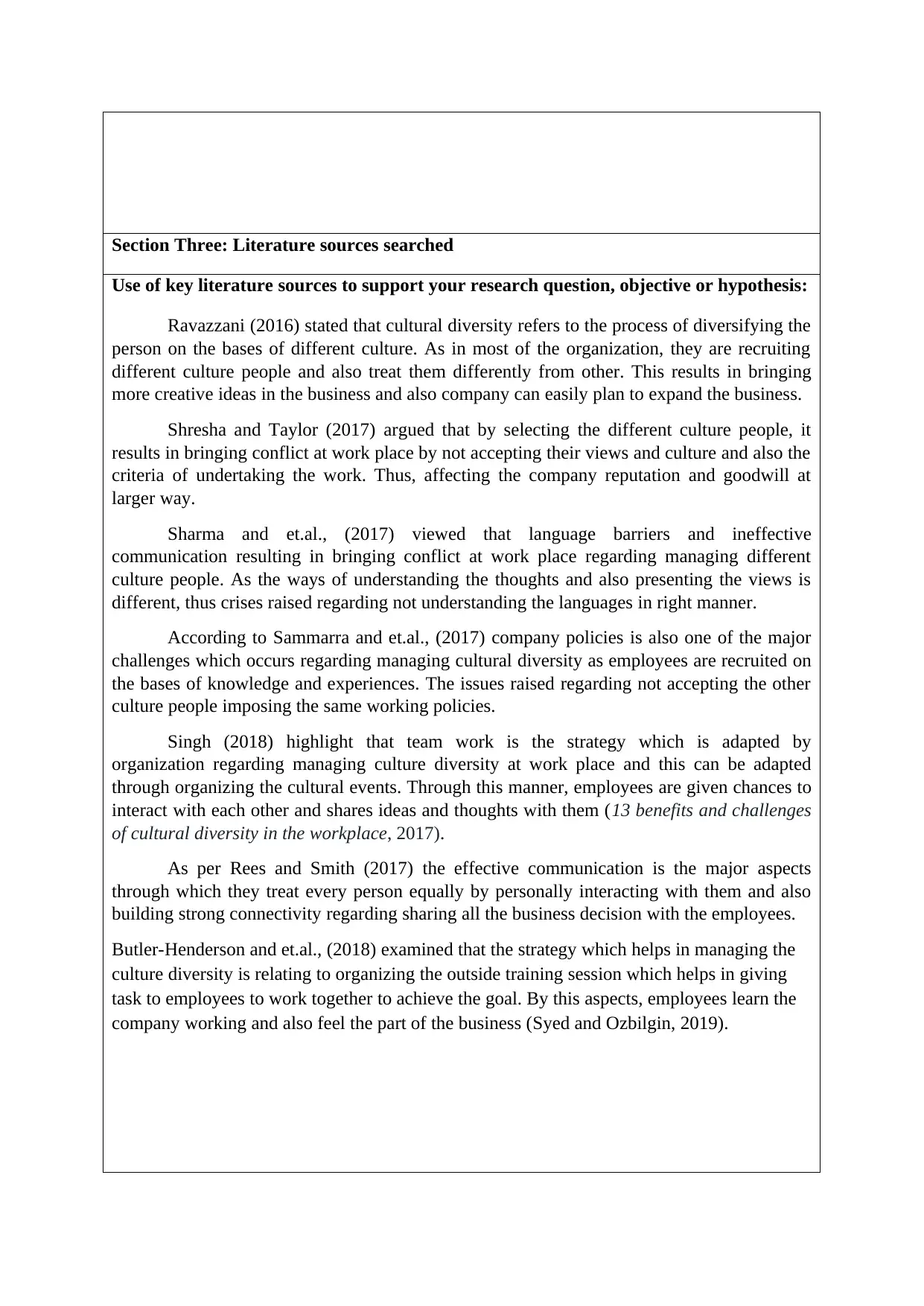
Section Three: Literature sources searched
Use of key literature sources to support your research question, objective or hypothesis:
Ravazzani (2016) stated that cultural diversity refers to the process of diversifying the
person on the bases of different culture. As in most of the organization, they are recruiting
different culture people and also treat them differently from other. This results in bringing
more creative ideas in the business and also company can easily plan to expand the business.
Shresha and Taylor (2017) argued that by selecting the different culture people, it
results in bringing conflict at work place by not accepting their views and culture and also the
criteria of undertaking the work. Thus, affecting the company reputation and goodwill at
larger way.
Sharma and et.al., (2017) viewed that language barriers and ineffective
communication resulting in bringing conflict at work place regarding managing different
culture people. As the ways of understanding the thoughts and also presenting the views is
different, thus crises raised regarding not understanding the languages in right manner.
According to Sammarra and et.al., (2017) company policies is also one of the major
challenges which occurs regarding managing cultural diversity as employees are recruited on
the bases of knowledge and experiences. The issues raised regarding not accepting the other
culture people imposing the same working policies.
Singh (2018) highlight that team work is the strategy which is adapted by
organization regarding managing culture diversity at work place and this can be adapted
through organizing the cultural events. Through this manner, employees are given chances to
interact with each other and shares ideas and thoughts with them (13 benefits and challenges
of cultural diversity in the workplace, 2017).
As per Rees and Smith (2017) the effective communication is the major aspects
through which they treat every person equally by personally interacting with them and also
building strong connectivity regarding sharing all the business decision with the employees.
Butler-Henderson and et.al., (2018) examined that the strategy which helps in managing the
culture diversity is relating to organizing the outside training session which helps in giving
task to employees to work together to achieve the goal. By this aspects, employees learn the
company working and also feel the part of the business (Syed and Ozbilgin, 2019).
Use of key literature sources to support your research question, objective or hypothesis:
Ravazzani (2016) stated that cultural diversity refers to the process of diversifying the
person on the bases of different culture. As in most of the organization, they are recruiting
different culture people and also treat them differently from other. This results in bringing
more creative ideas in the business and also company can easily plan to expand the business.
Shresha and Taylor (2017) argued that by selecting the different culture people, it
results in bringing conflict at work place by not accepting their views and culture and also the
criteria of undertaking the work. Thus, affecting the company reputation and goodwill at
larger way.
Sharma and et.al., (2017) viewed that language barriers and ineffective
communication resulting in bringing conflict at work place regarding managing different
culture people. As the ways of understanding the thoughts and also presenting the views is
different, thus crises raised regarding not understanding the languages in right manner.
According to Sammarra and et.al., (2017) company policies is also one of the major
challenges which occurs regarding managing cultural diversity as employees are recruited on
the bases of knowledge and experiences. The issues raised regarding not accepting the other
culture people imposing the same working policies.
Singh (2018) highlight that team work is the strategy which is adapted by
organization regarding managing culture diversity at work place and this can be adapted
through organizing the cultural events. Through this manner, employees are given chances to
interact with each other and shares ideas and thoughts with them (13 benefits and challenges
of cultural diversity in the workplace, 2017).
As per Rees and Smith (2017) the effective communication is the major aspects
through which they treat every person equally by personally interacting with them and also
building strong connectivity regarding sharing all the business decision with the employees.
Butler-Henderson and et.al., (2018) examined that the strategy which helps in managing the
culture diversity is relating to organizing the outside training session which helps in giving
task to employees to work together to achieve the goal. By this aspects, employees learn the
company working and also feel the part of the business (Syed and Ozbilgin, 2019).
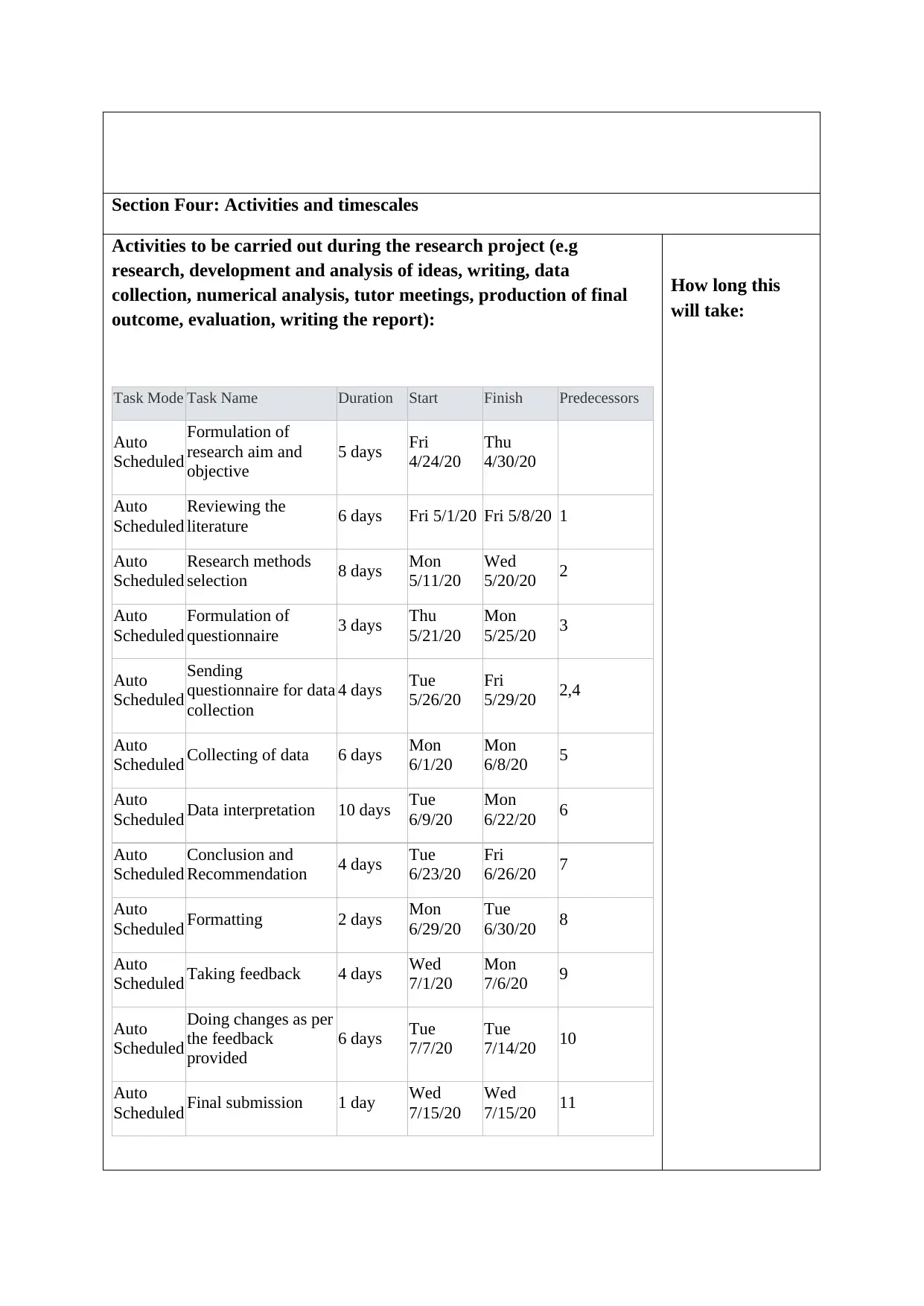
Section Four: Activities and timescales
Activities to be carried out during the research project (e.g
research, development and analysis of ideas, writing, data
collection, numerical analysis, tutor meetings, production of final
outcome, evaluation, writing the report):
Task Mode Task Name Duration Start Finish Predecessors
Auto
Scheduled
Formulation of
research aim and
objective
5 days Fri
4/24/20
Thu
4/30/20
Auto
Scheduled
Reviewing the
literature 6 days Fri 5/1/20 Fri 5/8/20 1
Auto
Scheduled
Research methods
selection 8 days Mon
5/11/20
Wed
5/20/20 2
Auto
Scheduled
Formulation of
questionnaire 3 days Thu
5/21/20
Mon
5/25/20 3
Auto
Scheduled
Sending
questionnaire for data
collection
4 days Tue
5/26/20
Fri
5/29/20 2,4
Auto
Scheduled Collecting of data 6 days Mon
6/1/20
Mon
6/8/20 5
Auto
Scheduled Data interpretation 10 days Tue
6/9/20
Mon
6/22/20 6
Auto
Scheduled
Conclusion and
Recommendation 4 days Tue
6/23/20
Fri
6/26/20 7
Auto
Scheduled Formatting 2 days Mon
6/29/20
Tue
6/30/20 8
Auto
Scheduled Taking feedback 4 days Wed
7/1/20
Mon
7/6/20 9
Auto
Scheduled
Doing changes as per
the feedback
provided
6 days Tue
7/7/20
Tue
7/14/20 10
Auto
Scheduled Final submission 1 day Wed
7/15/20
Wed
7/15/20 11
How long this
will take:
Activities to be carried out during the research project (e.g
research, development and analysis of ideas, writing, data
collection, numerical analysis, tutor meetings, production of final
outcome, evaluation, writing the report):
Task Mode Task Name Duration Start Finish Predecessors
Auto
Scheduled
Formulation of
research aim and
objective
5 days Fri
4/24/20
Thu
4/30/20
Auto
Scheduled
Reviewing the
literature 6 days Fri 5/1/20 Fri 5/8/20 1
Auto
Scheduled
Research methods
selection 8 days Mon
5/11/20
Wed
5/20/20 2
Auto
Scheduled
Formulation of
questionnaire 3 days Thu
5/21/20
Mon
5/25/20 3
Auto
Scheduled
Sending
questionnaire for data
collection
4 days Tue
5/26/20
Fri
5/29/20 2,4
Auto
Scheduled Collecting of data 6 days Mon
6/1/20
Mon
6/8/20 5
Auto
Scheduled Data interpretation 10 days Tue
6/9/20
Mon
6/22/20 6
Auto
Scheduled
Conclusion and
Recommendation 4 days Tue
6/23/20
Fri
6/26/20 7
Auto
Scheduled Formatting 2 days Mon
6/29/20
Tue
6/30/20 8
Auto
Scheduled Taking feedback 4 days Wed
7/1/20
Mon
7/6/20 9
Auto
Scheduled
Doing changes as per
the feedback
provided
6 days Tue
7/7/20
Tue
7/14/20 10
Auto
Scheduled Final submission 1 day Wed
7/15/20
Wed
7/15/20 11
How long this
will take:
⊘ This is a preview!⊘
Do you want full access?
Subscribe today to unlock all pages.

Trusted by 1+ million students worldwide
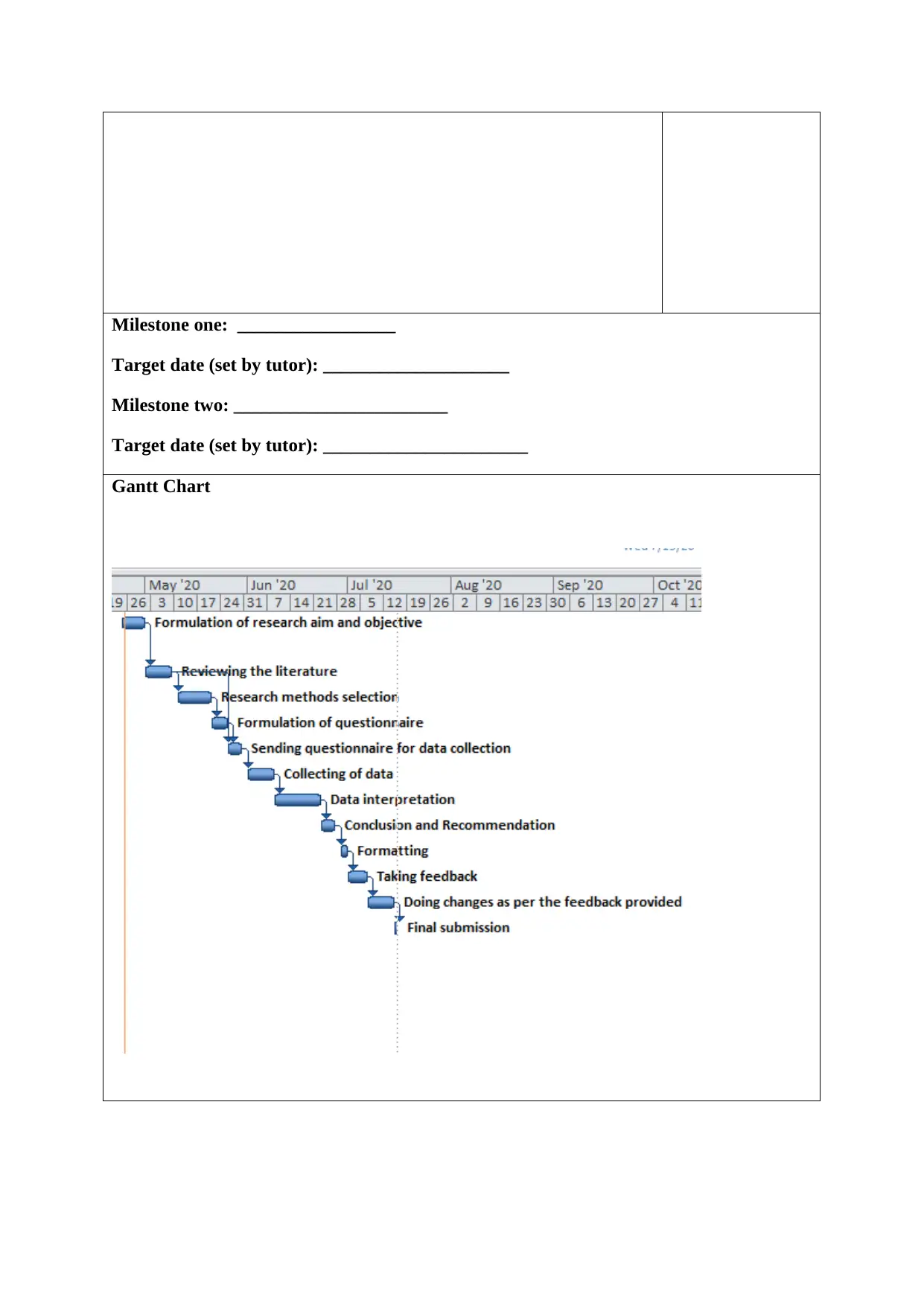
Milestone one: _________________
Target date (set by tutor): ____________________
Milestone two: _______________________
Target date (set by tutor): ______________________
Gantt Chart
Target date (set by tutor): ____________________
Milestone two: _______________________
Target date (set by tutor): ______________________
Gantt Chart
Paraphrase This Document
Need a fresh take? Get an instant paraphrase of this document with our AI Paraphraser
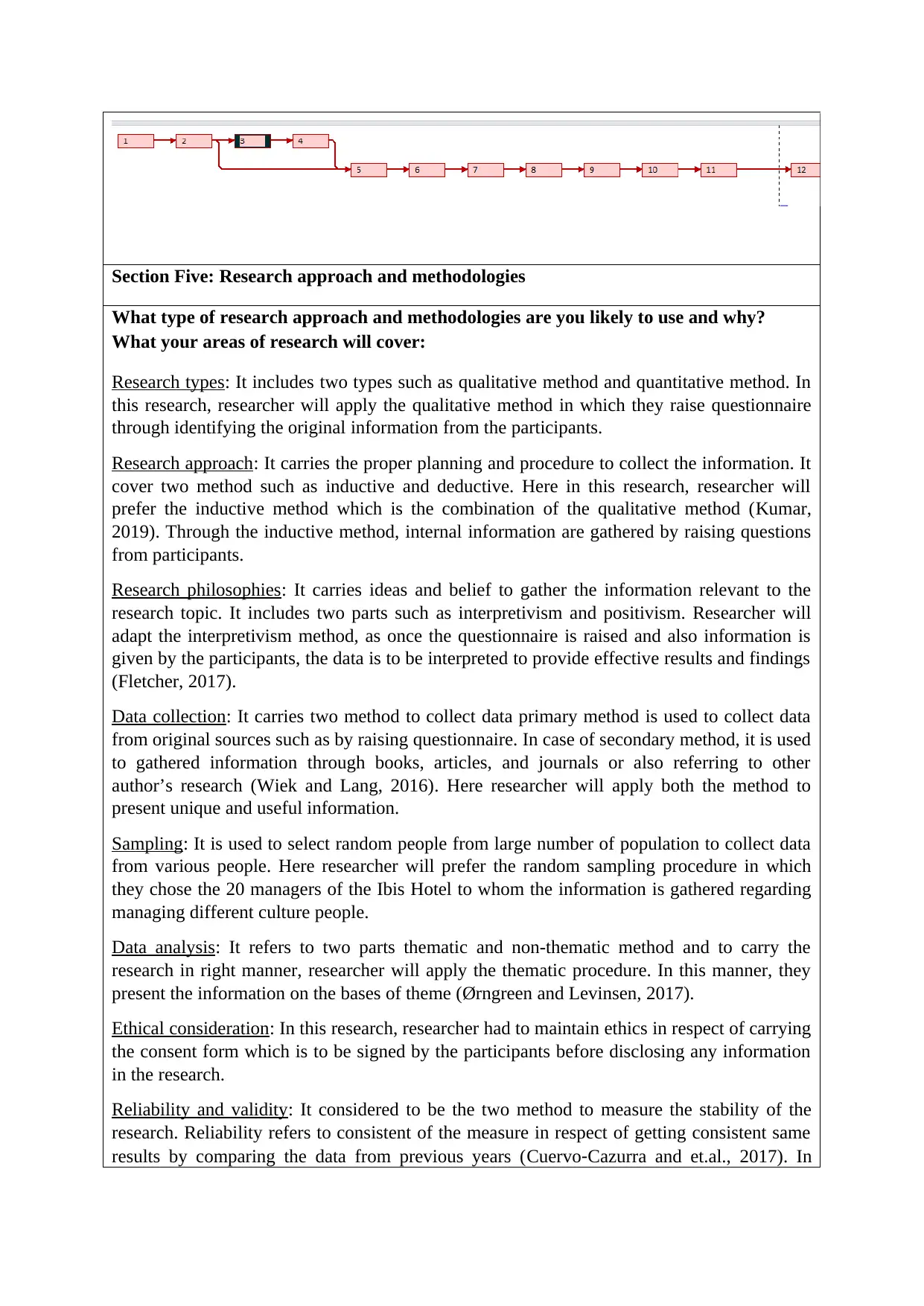
Section Five: Research approach and methodologies
What type of research approach and methodologies are you likely to use and why?
What your areas of research will cover:
Research types: It includes two types such as qualitative method and quantitative method. In
this research, researcher will apply the qualitative method in which they raise questionnaire
through identifying the original information from the participants.
Research approach: It carries the proper planning and procedure to collect the information. It
cover two method such as inductive and deductive. Here in this research, researcher will
prefer the inductive method which is the combination of the qualitative method (Kumar,
2019). Through the inductive method, internal information are gathered by raising questions
from participants.
Research philosophies: It carries ideas and belief to gather the information relevant to the
research topic. It includes two parts such as interpretivism and positivism. Researcher will
adapt the interpretivism method, as once the questionnaire is raised and also information is
given by the participants, the data is to be interpreted to provide effective results and findings
(Fletcher, 2017).
Data collection: It carries two method to collect data primary method is used to collect data
from original sources such as by raising questionnaire. In case of secondary method, it is used
to gathered information through books, articles, and journals or also referring to other
author’s research (Wiek and Lang, 2016). Here researcher will apply both the method to
present unique and useful information.
Sampling: It is used to select random people from large number of population to collect data
from various people. Here researcher will prefer the random sampling procedure in which
they chose the 20 managers of the Ibis Hotel to whom the information is gathered regarding
managing different culture people.
Data analysis: It refers to two parts thematic and non-thematic method and to carry the
research in right manner, researcher will apply the thematic procedure. In this manner, they
present the information on the bases of theme (Ørngreen and Levinsen, 2017).
Ethical consideration: In this research, researcher had to maintain ethics in respect of carrying
the consent form which is to be signed by the participants before disclosing any information
in the research.
Reliability and validity: It considered to be the two method to measure the stability of the
research. Reliability refers to consistent of the measure in respect of getting consistent same
results by comparing the data from previous years (Cuervo‐Cazurra and et.al., 2017). In
What type of research approach and methodologies are you likely to use and why?
What your areas of research will cover:
Research types: It includes two types such as qualitative method and quantitative method. In
this research, researcher will apply the qualitative method in which they raise questionnaire
through identifying the original information from the participants.
Research approach: It carries the proper planning and procedure to collect the information. It
cover two method such as inductive and deductive. Here in this research, researcher will
prefer the inductive method which is the combination of the qualitative method (Kumar,
2019). Through the inductive method, internal information are gathered by raising questions
from participants.
Research philosophies: It carries ideas and belief to gather the information relevant to the
research topic. It includes two parts such as interpretivism and positivism. Researcher will
adapt the interpretivism method, as once the questionnaire is raised and also information is
given by the participants, the data is to be interpreted to provide effective results and findings
(Fletcher, 2017).
Data collection: It carries two method to collect data primary method is used to collect data
from original sources such as by raising questionnaire. In case of secondary method, it is used
to gathered information through books, articles, and journals or also referring to other
author’s research (Wiek and Lang, 2016). Here researcher will apply both the method to
present unique and useful information.
Sampling: It is used to select random people from large number of population to collect data
from various people. Here researcher will prefer the random sampling procedure in which
they chose the 20 managers of the Ibis Hotel to whom the information is gathered regarding
managing different culture people.
Data analysis: It refers to two parts thematic and non-thematic method and to carry the
research in right manner, researcher will apply the thematic procedure. In this manner, they
present the information on the bases of theme (Ørngreen and Levinsen, 2017).
Ethical consideration: In this research, researcher had to maintain ethics in respect of carrying
the consent form which is to be signed by the participants before disclosing any information
in the research.
Reliability and validity: It considered to be the two method to measure the stability of the
research. Reliability refers to consistent of the measure in respect of getting consistent same
results by comparing the data from previous years (Cuervo‐Cazurra and et.al., 2017). In
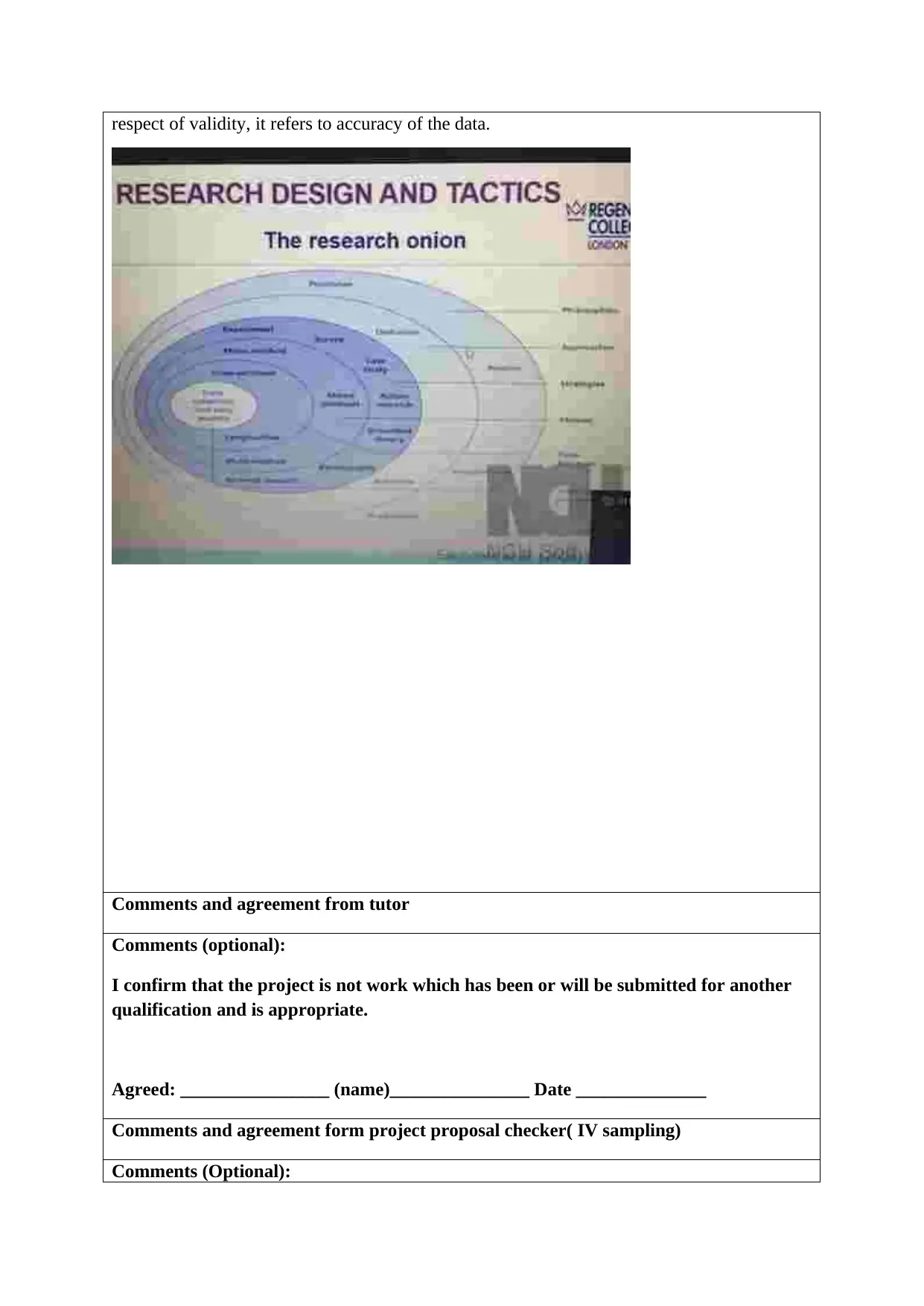
respect of validity, it refers to accuracy of the data.
Comments and agreement from tutor
Comments (optional):
I confirm that the project is not work which has been or will be submitted for another
qualification and is appropriate.
Agreed: ________________ (name)_______________ Date ______________
Comments and agreement form project proposal checker( IV sampling)
Comments (Optional):
Comments and agreement from tutor
Comments (optional):
I confirm that the project is not work which has been or will be submitted for another
qualification and is appropriate.
Agreed: ________________ (name)_______________ Date ______________
Comments and agreement form project proposal checker( IV sampling)
Comments (Optional):
⊘ This is a preview!⊘
Do you want full access?
Subscribe today to unlock all pages.

Trusted by 1+ million students worldwide
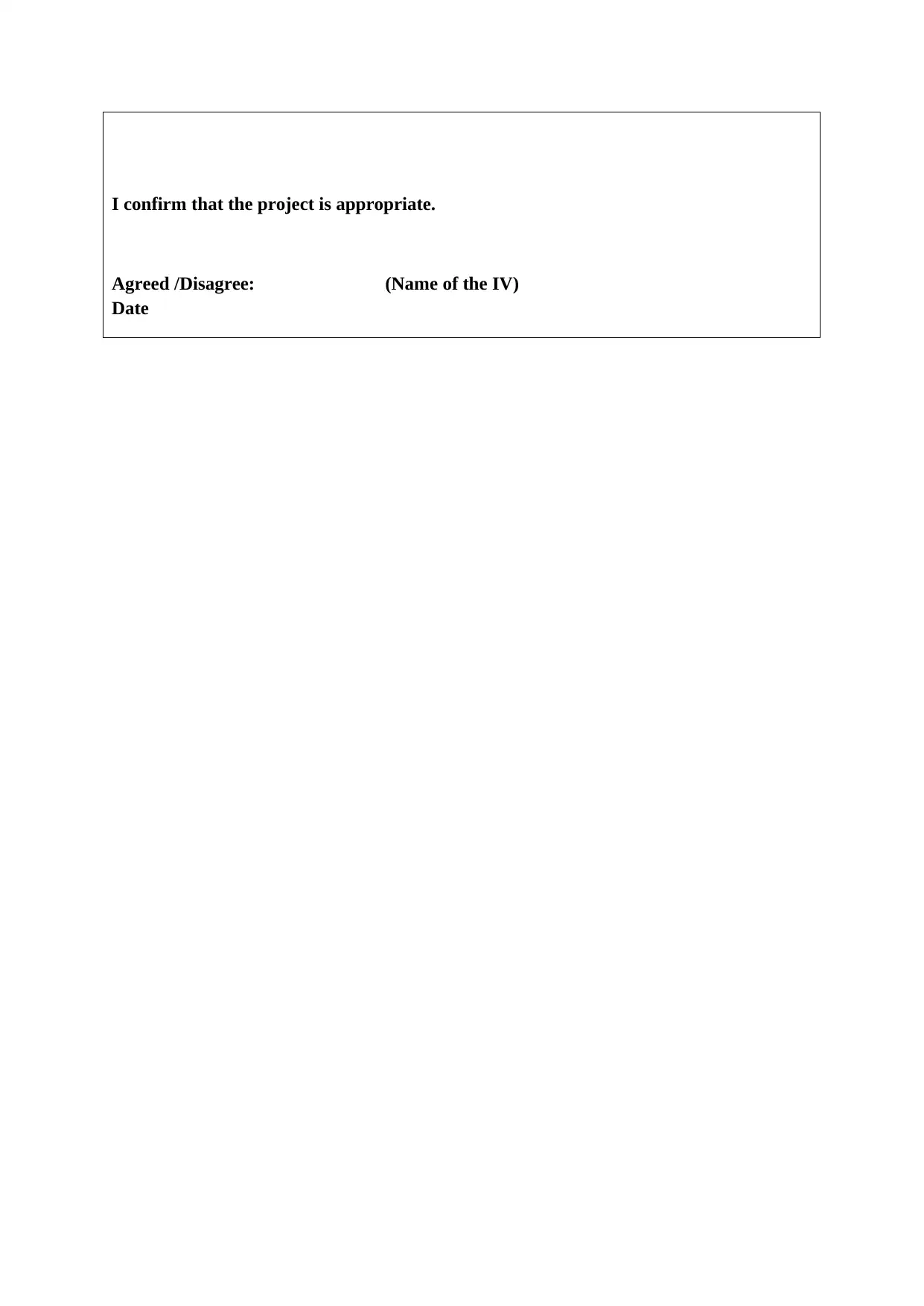
I confirm that the project is appropriate.
Agreed /Disagree: (Name of the IV)
Date
Agreed /Disagree: (Name of the IV)
Date
Paraphrase This Document
Need a fresh take? Get an instant paraphrase of this document with our AI Paraphraser
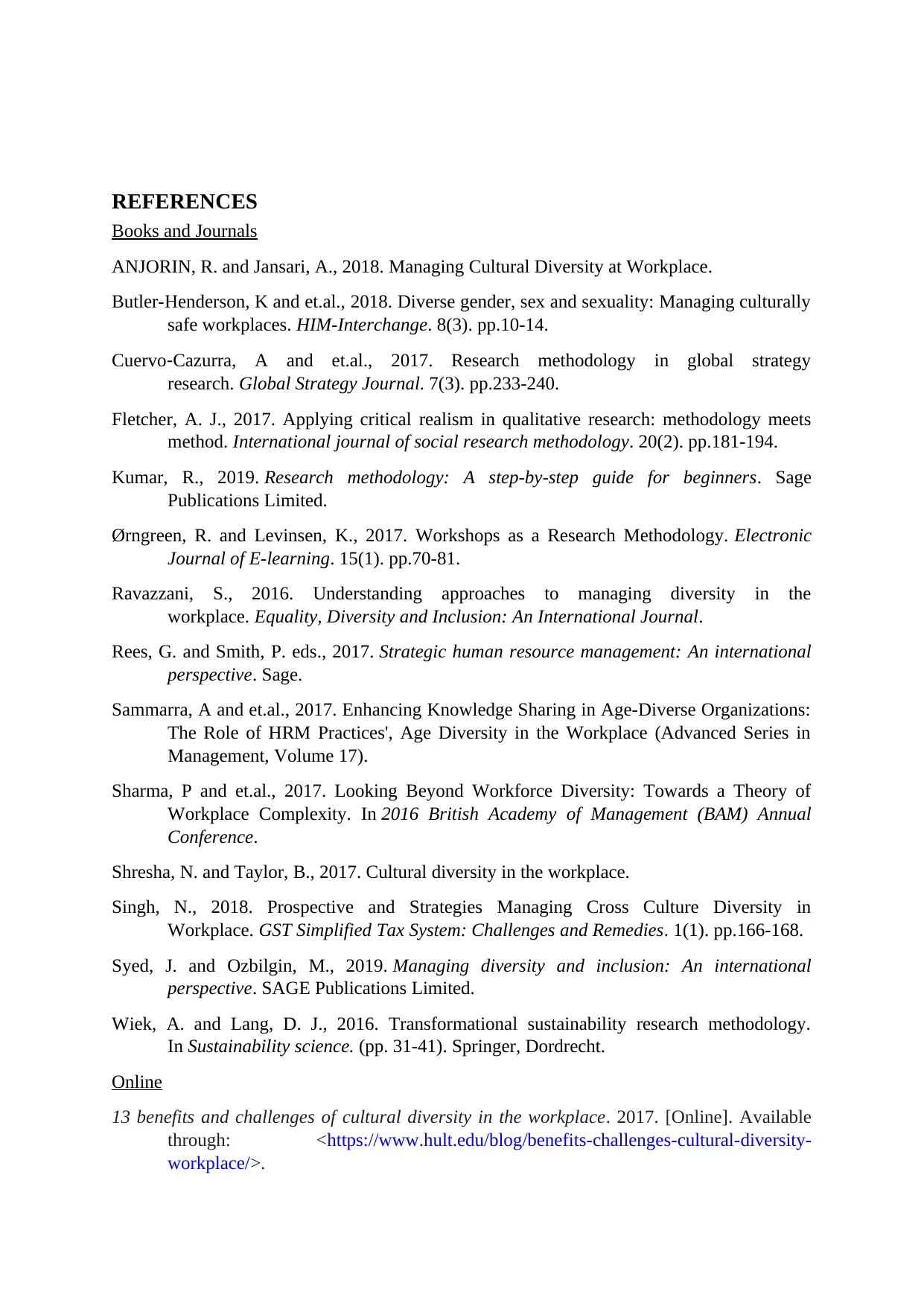
REFERENCES
Books and Journals
ANJORIN, R. and Jansari, A., 2018. Managing Cultural Diversity at Workplace.
Butler-Henderson, K and et.al., 2018. Diverse gender, sex and sexuality: Managing culturally
safe workplaces. HIM-Interchange. 8(3). pp.10-14.
Cuervo‐Cazurra, A and et.al., 2017. Research methodology in global strategy
research. Global Strategy Journal. 7(3). pp.233-240.
Fletcher, A. J., 2017. Applying critical realism in qualitative research: methodology meets
method. International journal of social research methodology. 20(2). pp.181-194.
Kumar, R., 2019. Research methodology: A step-by-step guide for beginners. Sage
Publications Limited.
Ørngreen, R. and Levinsen, K., 2017. Workshops as a Research Methodology. Electronic
Journal of E-learning. 15(1). pp.70-81.
Ravazzani, S., 2016. Understanding approaches to managing diversity in the
workplace. Equality, Diversity and Inclusion: An International Journal.
Rees, G. and Smith, P. eds., 2017. Strategic human resource management: An international
perspective. Sage.
Sammarra, A and et.al., 2017. Enhancing Knowledge Sharing in Age-Diverse Organizations:
The Role of HRM Practices', Age Diversity in the Workplace (Advanced Series in
Management, Volume 17).
Sharma, P and et.al., 2017. Looking Beyond Workforce Diversity: Towards a Theory of
Workplace Complexity. In 2016 British Academy of Management (BAM) Annual
Conference.
Shresha, N. and Taylor, B., 2017. Cultural diversity in the workplace.
Singh, N., 2018. Prospective and Strategies Managing Cross Culture Diversity in
Workplace. GST Simplified Tax System: Challenges and Remedies. 1(1). pp.166-168.
Syed, J. and Ozbilgin, M., 2019. Managing diversity and inclusion: An international
perspective. SAGE Publications Limited.
Wiek, A. and Lang, D. J., 2016. Transformational sustainability research methodology.
In Sustainability science. (pp. 31-41). Springer, Dordrecht.
Online
13 benefits and challenges of cultural diversity in the workplace. 2017. [Online]. Available
through: <https://www.hult.edu/blog/benefits-challenges-cultural-diversity-
workplace/>.
Books and Journals
ANJORIN, R. and Jansari, A., 2018. Managing Cultural Diversity at Workplace.
Butler-Henderson, K and et.al., 2018. Diverse gender, sex and sexuality: Managing culturally
safe workplaces. HIM-Interchange. 8(3). pp.10-14.
Cuervo‐Cazurra, A and et.al., 2017. Research methodology in global strategy
research. Global Strategy Journal. 7(3). pp.233-240.
Fletcher, A. J., 2017. Applying critical realism in qualitative research: methodology meets
method. International journal of social research methodology. 20(2). pp.181-194.
Kumar, R., 2019. Research methodology: A step-by-step guide for beginners. Sage
Publications Limited.
Ørngreen, R. and Levinsen, K., 2017. Workshops as a Research Methodology. Electronic
Journal of E-learning. 15(1). pp.70-81.
Ravazzani, S., 2016. Understanding approaches to managing diversity in the
workplace. Equality, Diversity and Inclusion: An International Journal.
Rees, G. and Smith, P. eds., 2017. Strategic human resource management: An international
perspective. Sage.
Sammarra, A and et.al., 2017. Enhancing Knowledge Sharing in Age-Diverse Organizations:
The Role of HRM Practices', Age Diversity in the Workplace (Advanced Series in
Management, Volume 17).
Sharma, P and et.al., 2017. Looking Beyond Workforce Diversity: Towards a Theory of
Workplace Complexity. In 2016 British Academy of Management (BAM) Annual
Conference.
Shresha, N. and Taylor, B., 2017. Cultural diversity in the workplace.
Singh, N., 2018. Prospective and Strategies Managing Cross Culture Diversity in
Workplace. GST Simplified Tax System: Challenges and Remedies. 1(1). pp.166-168.
Syed, J. and Ozbilgin, M., 2019. Managing diversity and inclusion: An international
perspective. SAGE Publications Limited.
Wiek, A. and Lang, D. J., 2016. Transformational sustainability research methodology.
In Sustainability science. (pp. 31-41). Springer, Dordrecht.
Online
13 benefits and challenges of cultural diversity in the workplace. 2017. [Online]. Available
through: <https://www.hult.edu/blog/benefits-challenges-cultural-diversity-
workplace/>.
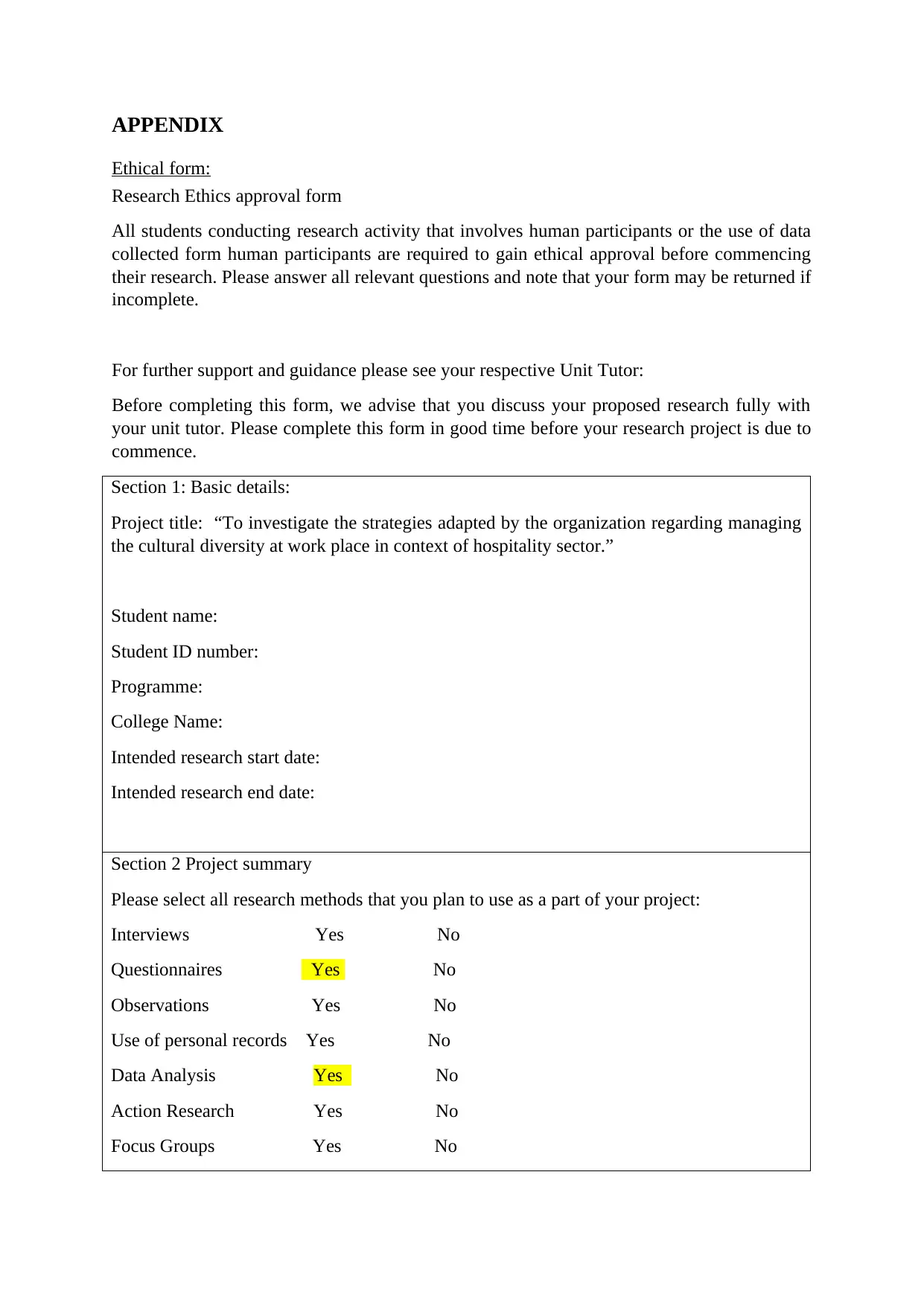
APPENDIX
Ethical form:
Research Ethics approval form
All students conducting research activity that involves human participants or the use of data
collected form human participants are required to gain ethical approval before commencing
their research. Please answer all relevant questions and note that your form may be returned if
incomplete.
For further support and guidance please see your respective Unit Tutor:
Before completing this form, we advise that you discuss your proposed research fully with
your unit tutor. Please complete this form in good time before your research project is due to
commence.
Section 1: Basic details:
Project title: “To investigate the strategies adapted by the organization regarding managing
the cultural diversity at work place in context of hospitality sector.”
Student name:
Student ID number:
Programme:
College Name:
Intended research start date:
Intended research end date:
Section 2 Project summary
Please select all research methods that you plan to use as a part of your project:
Interviews Yes No
Questionnaires Yes No
Observations Yes No
Use of personal records Yes No
Data Analysis Yes No
Action Research Yes No
Focus Groups Yes No
Ethical form:
Research Ethics approval form
All students conducting research activity that involves human participants or the use of data
collected form human participants are required to gain ethical approval before commencing
their research. Please answer all relevant questions and note that your form may be returned if
incomplete.
For further support and guidance please see your respective Unit Tutor:
Before completing this form, we advise that you discuss your proposed research fully with
your unit tutor. Please complete this form in good time before your research project is due to
commence.
Section 1: Basic details:
Project title: “To investigate the strategies adapted by the organization regarding managing
the cultural diversity at work place in context of hospitality sector.”
Student name:
Student ID number:
Programme:
College Name:
Intended research start date:
Intended research end date:
Section 2 Project summary
Please select all research methods that you plan to use as a part of your project:
Interviews Yes No
Questionnaires Yes No
Observations Yes No
Use of personal records Yes No
Data Analysis Yes No
Action Research Yes No
Focus Groups Yes No
⊘ This is a preview!⊘
Do you want full access?
Subscribe today to unlock all pages.

Trusted by 1+ million students worldwide
1 out of 15
Related Documents
Your All-in-One AI-Powered Toolkit for Academic Success.
+13062052269
info@desklib.com
Available 24*7 on WhatsApp / Email
![[object Object]](/_next/static/media/star-bottom.7253800d.svg)
Unlock your academic potential
Copyright © 2020–2026 A2Z Services. All Rights Reserved. Developed and managed by ZUCOL.




